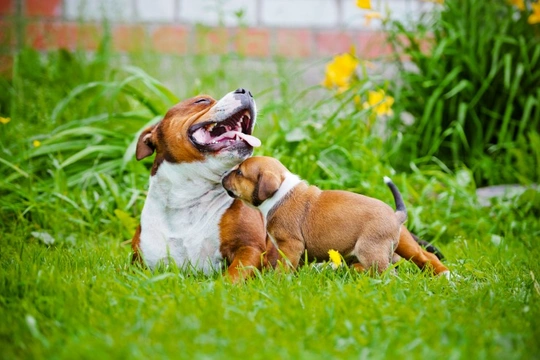
BVA/KC/ISDS Eye Scheme for breeding stock and their litters
Problems with the eyes and vision in general in dogs can come in many different types and presentations, but a great many such problems are hereditary in nature, and/or caused by a specific fault in conformation that can affect certain dog breeds.
In order to provide some standardisation and a formal protocol for the testing of canine eye health and in order to improve the ocular health of dog breeds as a whole, The Kennel Club in association with the British Veterinary Association and the International Sheep Dog Society runs an eye screening scheme to allow breeders to get their own breeding stock tested.
By providing a standardised screening scheme of this type, breeders of dog breeds that have a heightened risk of developing eye problems can make an informed decision about the viability of any given mating match in terms of breeding for health, and to reduce the chances of eye problems.
Any breed of dog can be examined under the scheme, however, for dog breeds that are listed on Schedule A of the scheme (breeds that are monitored by The Kennel Club for eye health) the results are also copied to The Kennel Club for inclusion on the Breed Records Supplement for each breed.
In this article, we will look at the BVA/KC/ICDS eye scheme in more detail, including how the scheme works and how to get your own dog tested. Read on to learn more.
Schedule A and Schedule breeds
The breeds that The Kennel Club advises be tested for their eye health are divided into two sections; Schedule A and Schedule B.
The dogs covered in Schedule A are breeds within which their prevalent eye problems are hereditary, and such dogs are examined by an eye panel of veterinary ophthalmologists, who are trained to look for the clinical signs of the hereditary eye conditions that are known to affect each breed.
Examined dogs are then designated as unaffected or affected by each respective condition.
Results of examinations conducted under Schedule A are copied to The Kennel Club, and included in their breed registration database, which can then be searched for using The Kennel Club’s Health Test Results finder tool.
For a complete list of breeds covered by Schedule A, check out this information.
Dogs covered by the Schedule B part of the scheme are breeds commonly affected by conditions that are suspected of having a hereditary element to them, but for which the mode of inheritance has not been confirmed.
Dogs examined under Schedule B have their results copied to the British Veterinary Association, but they are not included in the Health Tests Results Finder.
The Schedule B list is classed as breeds and conditions that are currently under review and investigation by The Kennel Club in terms of their eye health, as part of their programme to collate and analyse as much data as possible in order to detect problems in the making, and track the progress of such conditions.
For a complete list of breeds covered by Schedule B, check out this information.
How is testing performed?
Any breed or type of dog can be screened under the Eye Scheme, although breeders of dogs listed on Schedule A and Schedule B are those targeted by the scheme. In order to get your dog examined, you will need to locate one of the scheme’sappointed eye panellistsand make an appointment with them either directly or through your own vet.
For dog breeds covered under the scheme, the relevant documentation pertaining to the dog must accompany them to their examination, so that the certificate of their eye health can be provided.
It is also worth noting that for some dog breeds with particularly prevalent eye conditions that can develop in later life or that are progressive, testing may need to be performed regularly throughout the dog’s life.
As well as screening for adult dogs prior to breeding, litters can be tested too, and knowing that a litter has already been tested gives potential puppy buyers an added layer of reassurance that they are buying from a responsible breeder who takes every possible measure to ensure the health of their breeding stock.
The current fees for testing under the eye scheme are £55 for an adult dog (with an additional charge of £55 per dog if a gonioscopy is also indicated in the breed scheme) and £33 per pup for litters of up to three, then £11 per pup for additional puppies over the original three.
If for any reason the owner of a tested dog (or their own vet) disagrees with the results of the panel’s examination, the results can be appealed within 30 days. If this occurs, the dog will be re-tested blindly by a different panel, which attracts a second fee.



